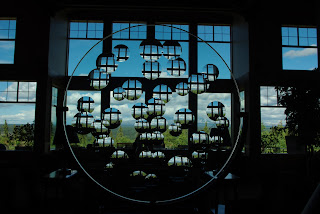How many of you like to clean windows? As a child, my siblings and I were each assigned various chores. I had to be in the right mood for windows!
If I had the time and was bored, cleaning the windows filled the time and could be fun... creating designs with the window cleaner and challenging myself to have streak-free windows. If I was in a rush, windows were frustrating... no matter how careful, each wipe often seemed to create more streaks!
 |
| What do you see? ~ ~ Click on image to enlarge ~ ~ (Photo credit: Pickles, Brian Crane, 12/29/24) |
Then there were the Couch-Coaches (or Know-It-Alls) offering semi-helpful suggestions: "You need to use vinegar and newspaper"; "I wouldn't use that cleaner"; "You missed a spot. Can't you see it?".
Dirty windows... I wonder if there is an existential reason for them?
 |
| How often do you see beyond the dirt? (Photo: deck chairs through dirty window - Larry Gardepie) |
Maybe the lesson in dirty windows is what Opal realized in the Pickles comic strip (above): what we see and assume about others may not be accurate! That is, we need to "Never Mind" the judgments we make about other people.
Rather than internalize these assumptions, it is important to name them -- say them out loud -- and then check to see if they are accurate. This is where Earl came in: he cleaned the window... without being a Couch-Coach.
 |
| Are there other ways to see beyond the dirt? (Photo: Copper River window prisms - Larry Gardepie) |
As we talk with and listen to others, it is important that we distinguish between facts, opinions, and conclusions. The assumptions we so easily make are similar to the dirt on the window: it distracts us; it keeps us from seeing what is beyond the dirt and the streaks.
Checking out our assumptions -- without judgment -- allows us to clear up or peel away the layers of misinformation that we have accumulated over time.
Are you in the mood to clean some windows this week?
.jpg) |
| Larry Gardepie Dialogue San Diego Consulting |





.jpg)



